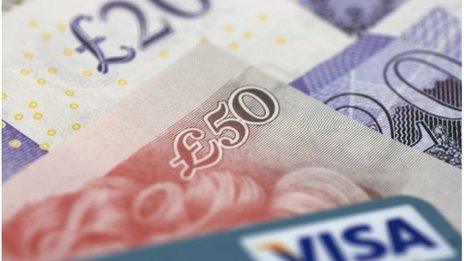UK's recovery not debt-fuelled
- Published
- comments

The overall indebtedness of the UK economy should fall pretty sharply in 2014
The publication of the 2013 national accounts contained a number of positives, not least of which was an upward revision to exports, and confirmation that business investment is recovering.
Or, to put it another way, although the belated escape of the UK economy from the long years of stagnation has been too dependent, many would say, on growth in consumer spending (in the traditional British way), the recovery is not as unbalanced as some have feared.
And there is another benign trend, noted by Michael Saunders of Citi, which is that national income is at last growing faster than our debts.
Or, to put it another way, the burden of our debts is - for the first time since the great crash of 2008 - diminishing.
To be clear, those debts remain big by historic standards, and the falls are not transformative of the UK's prospects.
But there does appear to be a trend of gentle deleveraging, or a reduction in debts as a percentage of income, after the many years of binging on credit.
And please, at this juncture, do not scream "unsustainable housing boom" and point to the current surge of households - especially in London and the South East - taking out big mortgages.
Falling debts
Of course, there is a bit of that going on, but in 2013 at least the big trends were of a more prudent sort.
As it happens, my numbers are a bit different from Saunders', because there are a variety of ways to cut the UK Economic Accounts, external.
But the direction of travel is the same.
Thus, debts of private non-financial companies fell between 2012 and 2013, from 99% of Gross Domestic Product (GDP) to 94%.
And household debts dropped from 94% to 91.5% of GDP.
Those ratios are still pretty high by historic standards, but the falls are significant.
However, when it comes to the public sector, the economic accounts do not really tally with what we know to be the underlying picture, that of rising indebtedness: they show a fall in gross central government indebtedness from 100% of GDP to 97% (or from 71% to 69% on a net basis), presumably because they do not adjust for a number of one-off transactions that distort the fundamental trend.
But even if we use the Office for Budget Responsibility's estimate that the government borrowed the equivalent of about 7% of GDP in the last calendar year, aggregate indebtedness in the real economy is still high, at about 300% of GDP, but it may be very slightly shrinking.
This leads to two stupidly obvious thoughts.
First, it would be wrong to characterise the recovery as debt-fuelled.
Second, with austerity rolling relentlessly on this year, and GDP at market prices likely to keep rising faster than private sector debts, 2014 should be a year in which the overall leverage or indebtedness of the British economy falls pretty sharply.